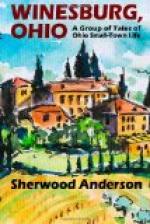Once freed from the army, I started to write literary criticism, and in 1951 I published a critical biography of Anderson. It came shortly after Lionel Trilling’s influential essay attacking Anderson, an attack from which Anderson’s reputation would never quite recover. Trilling charged Anderson with indulging a vaporous sentimentalism, a kind of vague emotional meandering in stories that lacked social or spiritual solidity. There was a certain cogency in Trilling’s attack, at least with regard to Anderson’s inferior work, most of which he wrote after Winesburg, Ohio. In my book I tried, somewhat awkwardly, to bring together the kinds of judgment Trilling had made with my still keen affection for the best of Anderson’s writings. By then, I had read writers more complex, perhaps more distinguished than Anderson, but his muted stories kept a firm place in my memories, and the book I wrote might be seen as a gesture of thanks for the light—a glow of darkness, you might say—that he had brought to me.
Decades passed. I no longer read Anderson, perhaps fearing I might have to surrender an admiration of youth. (There are some writers one should never return to.) But now, in the fullness of age, when asked to say a few introductory words about Anderson and his work, I have again fallen under the spell of Winesburg, Ohio, again responded to the half-spoken desires, the flickers of longing that spot its pages. Naturally, I now have some changes of response: a few of the stories no longer haunt me as once they did, but the long story “Godliness,” which years ago I considered a failure, I now see as a quaintly effective account of the way religious fanaticism and material acquisitiveness can become intertwined in American experience.
* * *
Sherwood Anderson was born in Ohio in 1876. His childhood and youth in Clyde, a town with perhaps three thousand souls, were scarred by bouts of poverty, but he also knew some of the pleasures of pre-industrial American society. The country was then experiencing what he would later call “a sudden and almost universal turning of men from the old handicrafts towards our modern life of machines.” There were still people in Clyde who remembered the frontier, and like America itself, the town lived by a mixture of diluted Calvinism and a strong belief in “progress,” Young Sherwood, known as “Jobby”—the boy always ready to work—showed the kind of entrepreneurial spirit that Clyde respected: folks expected him to become a “go-getter,” And for a time he did. Moving to Chicago in his early twenties, he worked in an advertising agency where he proved adept at turning out copy. “I create nothing, I boost, I boost,” he said about himself, even as, on the side, he was trying to write short stories.
In 1904 Anderson married and three years later moved to Elyria, a town forty miles west of Cleveland, where he established a firm that sold paint. “I was going to be a rich man.... Next year a bigger house; and after that, presumably, a country estate.” Later he would say about his years in Elyria, “I was a good deal of a Babbitt, but never completely one.” Something drove him to write, perhaps one of those shapeless hungers—a need for self-expression? a wish to find a more authentic kind of experience?—that would become a recurrent motif in his fiction.




